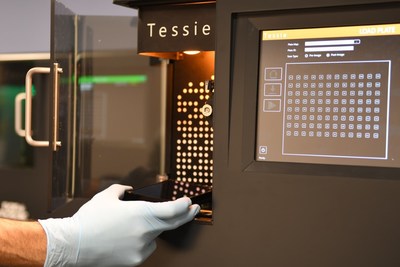The International Society to Advance Alzheimer's Research and Treatment Perioperative Cognition and Delirium PIA has chosen Dr. Feng Liang's paper, "Preoperative Plasma Tau-PT217 and Tau-PT181 Are Associated with Postoperative Delirium," as the winner of the 2023 Early Career Investigator Paper of the Year Award.
Using the NanoMosaic TessieTM device, Dr. Liang, a professor of anaesthesia at Harvard Medical School and of critical care and pain medicine at Mass General Research Institute, obtained the findings detailed in the publication. The system makes use of cutting-edge technology that allows for the high-throughput identification of protein biomarkers and 7 orders of dynamic range from small sample volumes. The connection between preoperative plasma tau protein levels and postoperative delirium in older surgical patients was first identified thanks in large part to the technique.
Using the NanoMosaic TessieTM device, Dr. Liang, a professor of anaesthesia at Harvard Medical School and of critical care and pain medicine at Mass General Research Institute, obtained the findings detailed in the publication. The system makes use of cutting-edge technology that allows for the high-throughput identification of protein biomarkers and 7 orders of dynamic range from small sample volumes. The connection between preoperative plasma tau protein levels and postoperative delirium in older surgical patients was first identified thanks in large part to the technique.
The research discovered a link between greater levels of two particular Tau proteins, Tau-PT217 and Tau-PT181, and a higher risk of postoperative delirium. These findings offer a possible biomarker for identifying patients who are at risk for postoperative delirium and may help develop targeted treatments or preventative measures for this frequent complication. The study was carried out at Dr. Zhongcong Xie's lab at Massachusetts General Hospital under the direction of the Henry Knowles Beecher Professor of Anaesthesia at Massachusetts General Hospital and Harvard Medical School.
"We investigated the relationship between plasma levels of Tau-PT217 and Tau-PT181 and the severity of postoperative delirium in a cohort of 139 patients." According to Dr. Feng Liang, tests of phosphorylated tau are difficult since the plasma concentrations of this protein are so low. According to the findings, postoperative delirium is very sensitive and specifically related with preoperative plasma levels of Tau-PT217, Liang said.
"We are happy that phosphorylated Tau proteins are emerging as important plasma indicators for post-operative delirium while applauding Dr. Liang on his achievement. In order to validate Tau-PT217 as potential predictive biomarkers for post-operative delirium, we will work with Dr. Xie's group and continue developing extremely sensitive neuro-assays on the TessieTM platform, according to Dr. Qimin Quan, Co-Founder and Chief Scientific Officer of NanoMosaic.
The Early Career Investigator Paper of the Year Award honours outstanding work in the area of perioperative cognition and delirium by early career researchers. This honour recognises the significant achievements of young scientists and promotes sustained brilliance in this crucial field of study.
John Boyce, President, CEO, and Co-Founder of NanoMosaic, as well as Co-Founder of Tiger Gene, LLC, said, "We extend our warmest congratulations to Dr. Feng Liang on this well-deserved recognition and look forward to his future contributions in not only perioperative delirium, but also in the broader neurology field." "Dr. Liang, working closely with Dr. Xie in his laboratory at Massachusetts General Hospital, are leading pioneers on course to drastically improve the treatment paradigm of anaesthesia protocols in healthcare," Boyce added. It is an honour for NanoMosaic to collaborate with such innovators.
Source prnewswire



No Comments